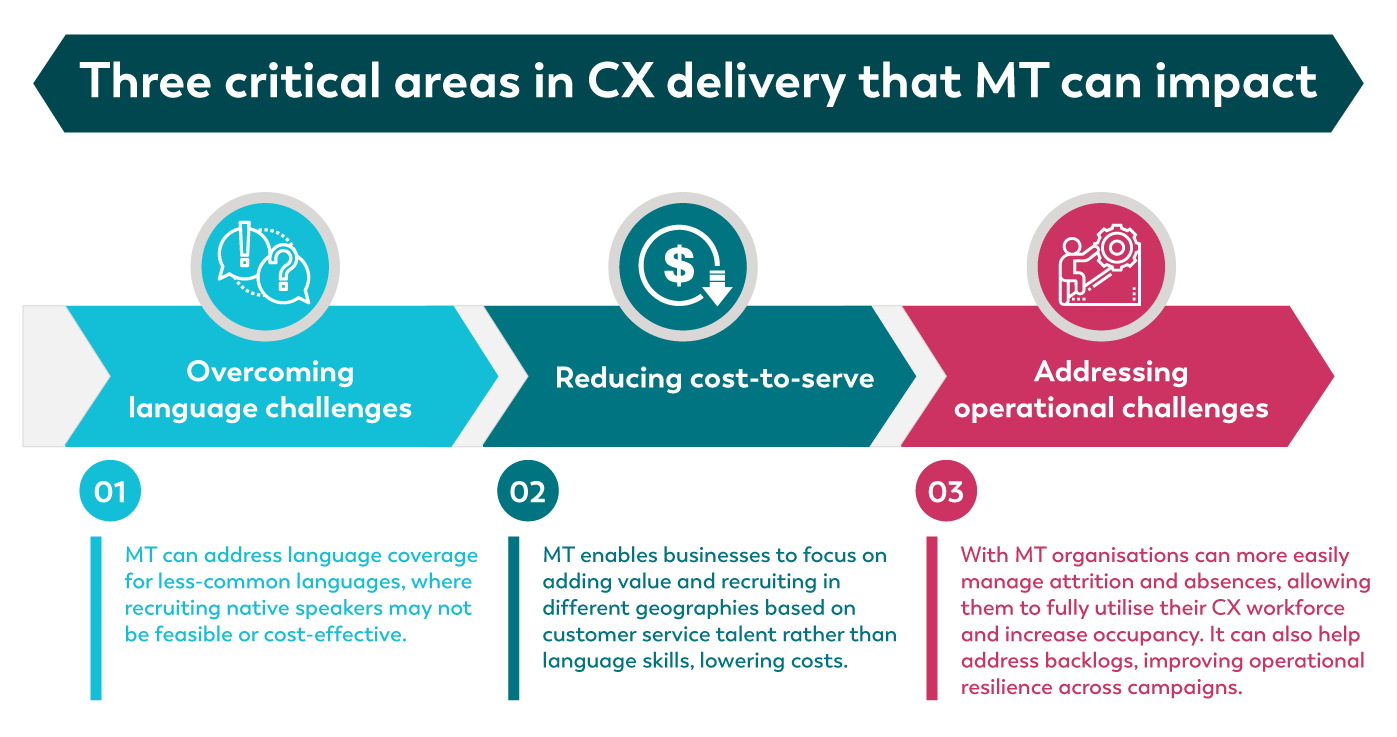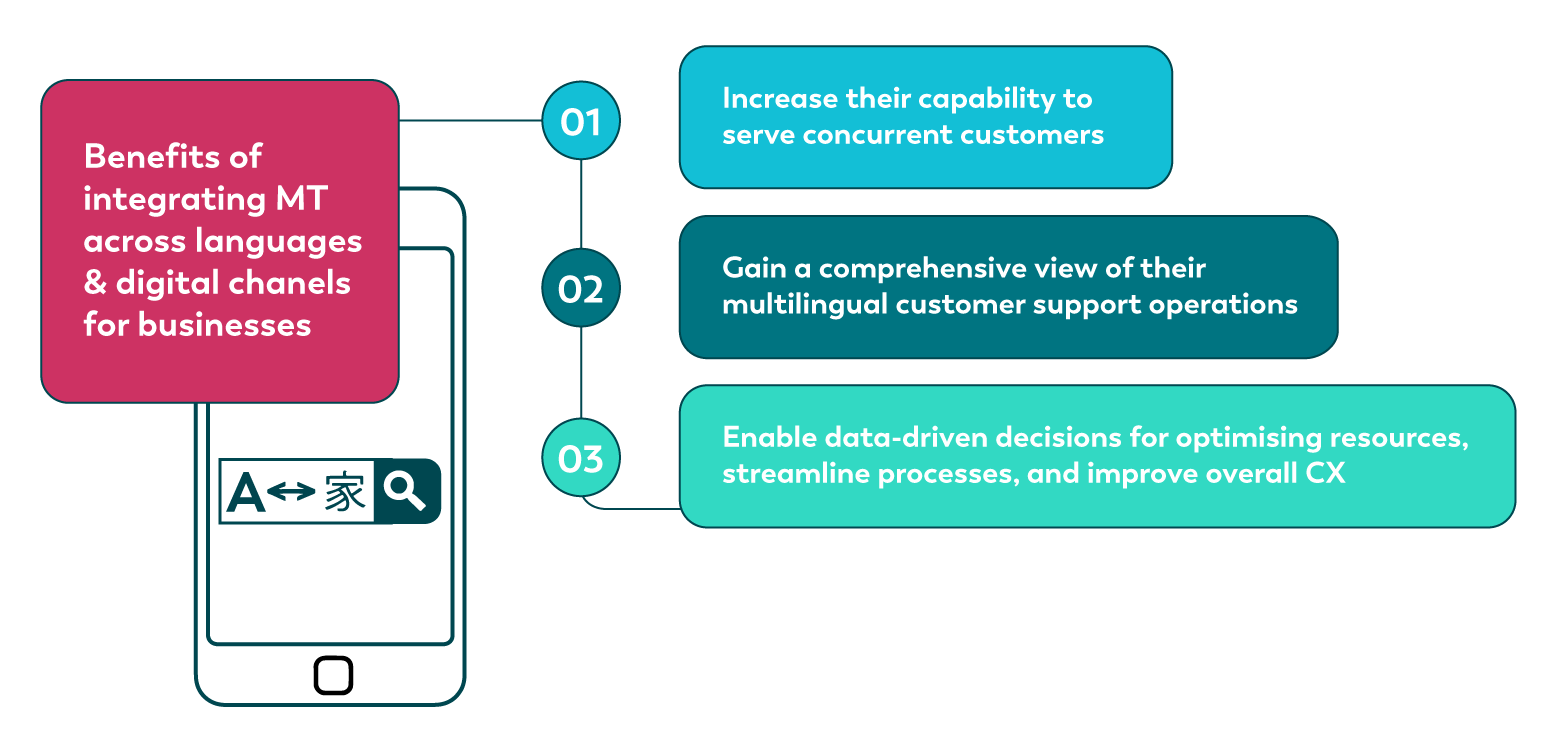Are you speaking the right language?
With global customers more connected and engaged than ever, multilingual customer experience (CX) has become an important avenue to business success. But high costs, stiff competition, and growing talent shortages make it difficult to scale at the required pace.
Recently, however, technological advancements, such as machine translation (MT) and artificial intelligence (AI), have made it more feasible for companies to manage and grow their multilingual CX operations effectively and cost-efficiently.
In this article, we examine how MT can empower organisations of any size to adapt to the evolving CX needs of their customer base and, ultimately, stand out in the global marketplace.
What is machine translation?
Machine translation is a powerful tool that utilises AI and machine learning to translate text from one language to another. As the translation model learns over time, the quality of translations improves.
MT can handle speed and volume remarkably efficiently, translating millions of words almost instantaneously while improving its performance over time. With brand tone of voice so vitally important for many businesses, these inputs can be integrated into the MT solution to ensure that the correct vocabulary is used and tone of voice is maintained at all times.

Let’s look more closely at these challenges and consider how MT can help.
Challenge 1: Language capabilities and the talent hunt
Successful multilingual CX operations require striking the right balance between language proficiency and customer service expertise when recruiting talent.
Traditionally, multilingual CX relied on centralised hubs with diverse language speakers, like Spain, Romania, or Egypt. However, this approach often led to a talent search prioritising language capabilities over customer service skills.
The shift to work-from-home (WFH) broadened the talent pool, allowing companies to access a geographically dispersed workforce, but it also intensified competition for attracting and retaining top candidates. Sourcing speakers of specific languages, such as Nordic languages (with only 26 million speakers worldwide), remains a challenge.
The MT solution: Machine translation technology frees businesses to focus on attracting, recruiting, and retaining talent with solid customer service skills without being limited by language proficiency. The cost savings also allow financial space for more competitive compensation packages and professional development investments, further enticing great candidates to the organisation.
Challenge 2: Balancing costs and embracing digitalisation
With the growing preference of companies to increase multilingual self-service options and transition to digital channels, the challenge is figuring out how to achieve this without breaking the bank.
Plus, the cost of hiring for language skills in the United Kingdom is significantly higher than in most other geographies, so as demand for new languages fluctuates, businesses need the agility to expand without compromising CX or incurring high costs.
If organisations can utilise resources more efficiently by automating repetitive or routine processes, they will inevitably optimise their workforce, reduce expenses, and free employees to focus on higher-value tasks.
The MT solution: Using a single solution that combines voice and digital customer support with machine translation makes managing and growing multilingual customer service easier and more cost-effective. By integrating MT across all languages and digital channels, businesses significantly increase their capability to serve concurrent customers, gain a comprehensive view of their multilingual customer support operations, enable data-driven decisions for optimising resources, streamline processes, and improve overall CX.
Challenge 3: Achieving Operational Resilience
Factors like employee attrition, absences, and seasonal fluctuations in demand can strain resources, making it difficult for organisations to maintain consistent service quality. The scarcity of native language speakers only adds to the challenge, further stretching the capacity of multilingual support teams.
When dealing with variations in contact volumes across different languages, businesses must adapt quickly to maintain service levels. Rapidly training staff to handle new or complex queries in multiple languages can also pose a significant challenge.
For example, organisations might need to manage the effects of frequent policy or product updates across multiple languages, ensuring they can effectively communicate changes to customers while maintaining operational resilience across campaigns. Companies need a solution to streamline this information dissemination, reduce response times, and adapt to changing customer demands without incurring long-term expenses.
The MT solution: Machine translation can temporarily augment the workforce in any given specific market to support increased volume, eliminating the need for additional native speakers. It allows employees to focus on their expertise, improving workforce efficiency and helping organisations adapt to changing customer demands. Ultimately, machine translation technology enables prompt, accurate responses to customer enquiries, regardless of language, significantly improving operational resilience, customer satisfaction, and brand loyalty.
Quick takeaways
- Work-from-home has broadened the talent pool, intensifying competition for top candidates and highlighting the challenge of balancing language proficiency and customer service skills.
- Machine translation (MT) allows organisations to optimise resources and embrace digitalisation, improving efficiency and reducing costs in multilingual customer support operations.
- Achieving operational resilience is essential amidst factors like employee attrition, absences, and seasonal fluctuations, requiring businesses to adapt quickly to maintain service levels.
- Rapidly training staff to handle new or complex queries in multiple languages can be challenging, but MT can augment the workforce and improve efficiency, enabling adaptation to changing customer demands.
- MT technology enhances operational resilience, ensuring prompt, accurate responses to customer enquiries, and boosting customer satisfaction and brand loyalty.
At Webhelp, our customised machine translation platform, Polyglot, is specifically designed for customer service, with features that constantly evolve and improve based on real-world operational experiences and client demands. This solution has empowered our CX agents to serve customers in languages beyond their expertise while achieving higher Net Promoter Score (NPS) results than native-speaking teams and enhancing operations for over 40 clients.
As evidenced with Polyglot, the implementation and continuous improvement of MT technology can equip your organisation to deliver exceptional service in multiple languages, enhancing customer satisfaction and driving growth.
Now you’re speaking the right language.
If you’d like to find out more, please do not hesitate to get in touch.






